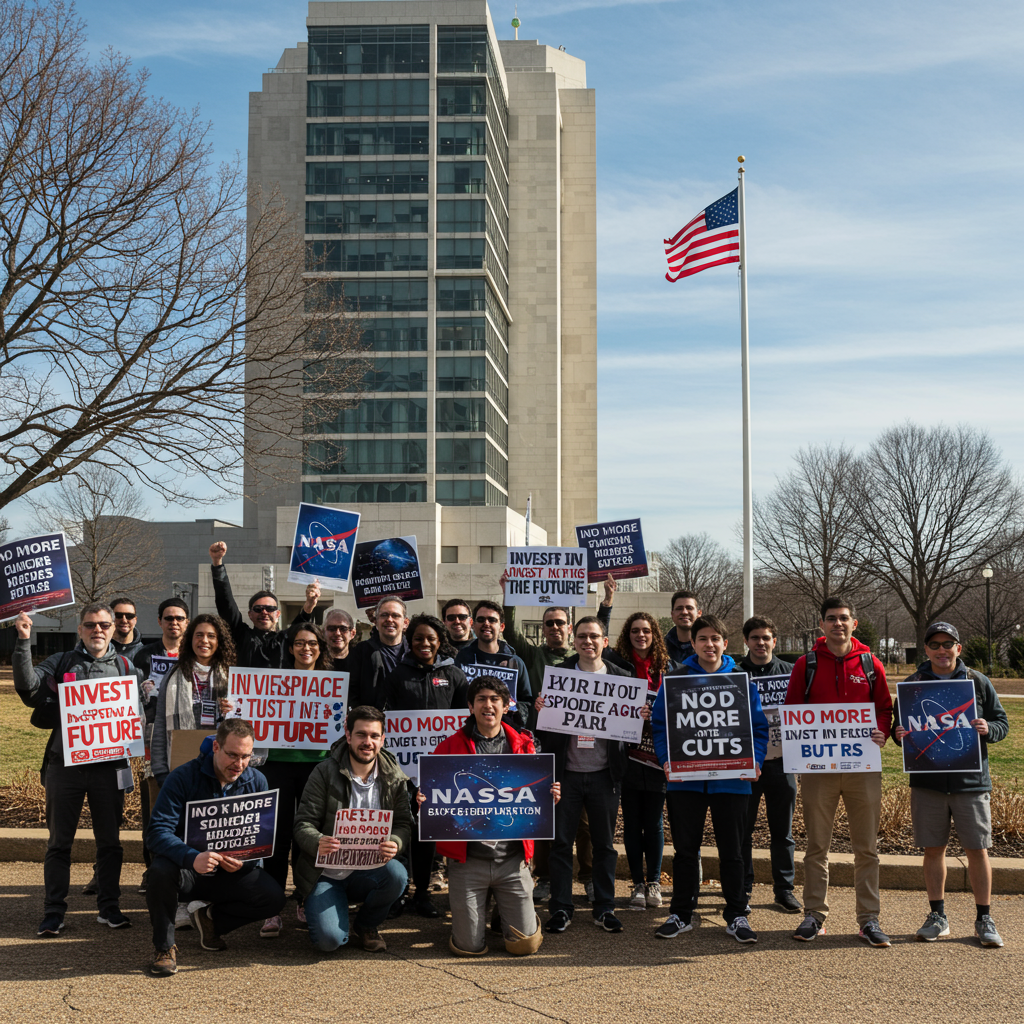Advocates for America’s space program are staging a significant protest at NASA Headquarters in Washington, DC, raising alarm over proposed federal budget cuts that threaten jobs, critical research, and the future of U.S. innovation in space and aeronautics. Following a similar demonstration in Cleveland, Ohio, this upcoming rally highlights growing opposition to potential reductions impacting NASA centers and personnel nationwide. Organizers emphasize their goal is to increase public and political awareness about the profound consequences of underfunding the nation’s space agency during a critical period for exploration and scientific advancement.
Deep Concerns Over Proposed NASA Budget Cuts
The planned demonstration in Washington, DC, is a direct response to a proposed federal budget that suggests substantial reductions across NASA’s operations. Analysis of the proposal indicates potential deep cuts to both the agency’s workforce and essential science funding. At the forefront of concerns is the impact on centers like NASA Glenn Research Center in Cleveland, where the budget suggests eliminating a significant number of civil service positions. This potential reduction represents a large percentage of the center’s current staff, sparking widespread anxiety among employees, their families, and regional leaders who recognize NASA Glenn’s vital role.
The proposed cuts are not isolated to one center but are part of a broader plan that could see a considerable portion of NASA’s overall workforce eliminated. Simultaneously, funding for critical scientific endeavors could face severe curtailment. These proposed financial restraints have quickly become a major flashpoint for those who believe robust investment in NASA is essential for national security, technological competitiveness, and expanding humanity’s understanding of the universe.
Threat to Regional Economies and Jobs
The potential impact of these proposed NASA budget cuts extends far beyond the agency itself, posing a significant threat to regional economies. In Cleveland, for instance, NASA Glenn is an integral part of the local economic landscape. Experts estimate the center contributes substantial economic activity annually, underscoring its importance to the region’s prosperity. The potential loss of hundreds of high-paying civil service jobs at Glenn would have a ripple effect, impacting countless ancillary positions supported by the center’s presence. Regional business leaders voice deep concern that jeopardizing these jobs also weakens the area’s standing as an innovation hub. They stress that NASA centers are powerhouses driving technological advancements with broad applications across industries.
Critical Research and Innovation at Risk
Beyond job numbers and economic figures, opponents of the budget proposal emphasize the potential loss of invaluable scientific expertise and unique research capabilities. Civil servants at NASA centers perform mission-critical work that is often specialized and not easily replicated outside the agency. Facilities like the Icing Research Tunnel at NASA Glenn, for example, are unique national assets crucial for ensuring flight safety across the commercial aviation sector. Cutting staff and funding jeopardizes ongoing research in areas like new fuel technologies, advanced propulsion, acoustics, and other vital aeronautics fields that underpin future transportation and space exploration. Employees and retirees who dedicated decades to this work warn that proposed cuts could dismantle teams and capabilities built over years, hindering progress and potentially ceding leadership in key technological areas.
Details of the Washington, DC Protest
The upcoming protest event is scheduled to take place at NASA Headquarters in Washington, DC. Organizers have secured a formal permit from the Metro DC Police, ensuring the demonstration is conducted safely and legally. The protest is planned for a specific morning timeframe, allowing participants to gather and voice their concerns outside the agency’s main administrative building. Organizers have stated clearly that while they aim to raise awareness about the negative implications of the proposed budget cuts, they do not intend to obstruct access to the building or prevent personnel from entering or leaving. Their focus remains squarely on educating the public and lawmakers about the risks posed by insufficient funding for NASA’s vital programs and workforce.
Advocacy Efforts and Political Responses
The pushback against the proposed NASA budget cuts involves a wide range of stakeholders. Advocacy groups dedicated to science funding and space exploration are mobilizing support. Current and retired NASA employees are speaking out, sharing personal stories about the value of their work and the potential hardship of job losses. Business leaders in affected regions are also actively lobbying federal officials, highlighting the economic and innovation impact of NASA centers on their communities.
Responses from elected officials to the proposed budget cuts have varied. Some lawmakers from regions hosting NASA centers have publicly expressed concerns and pledged to fight for more favorable funding outcomes during the congressional budget process. The hope among advocates is that Congress will ultimately restore funding and staffing levels deemed necessary to maintain NASA’s critical missions and preserve the nation’s leadership in space and aeronautics. The budget discussions are ongoing, with lawmakers reportedly aiming to finalize appropriations bills in the coming weeks.
Frequently Asked Questions
Why are people protesting proposed NASA budget cuts?
People are protesting proposed federal budget cuts due to concerns about significant job losses, particularly at centers like NASA Glenn, and substantial reductions in funding for crucial science and research programs. Advocates argue these cuts threaten highly skilled civil servant positions, negatively impact regional economies, jeopardize unique research facilities, and could hinder U.S. progress in space exploration and aeronautics, undermining national innovation and competitiveness.
Where is the protest against NASA budget cuts happening and when?
A notable protest event highlighting concerns over NASA budget cuts is planned for NASA Headquarters in Washington, DC. The demonstration is scheduled to occur on a Monday morning from 7:00 am to 11:00 am. This follows a previous protest held at NASA Glenn Research Center in Cleveland, Ohio, indicating coordinated efforts to raise awareness about the issue across different NASA locations.
What is the potential impact of these proposed NASA budget cuts?
The potential impact of the proposed NASA budget cuts is multifaceted and severe. It includes the potential elimination of thousands of civil service jobs across the agency, significantly impacting dedicated personnel and local economies dependent on NASA centers. Crucial scientific research and development projects could be canceled or delayed, potentially leading to the loss of unique capabilities and expertise. Critics argue these cuts could damage America’s leadership in space and aviation innovation for years to come.
The Future of NASA Hinges on Funding Decisions
The protests at NASA centers underscore the deep concern among employees, advocates, and regional stakeholders regarding the proposed federal budget. The potential for widespread job losses and significant cuts to science funding is seen as a direct threat to the agency’s ability to execute its mission effectively and maintain the nation’s standing as a leader in space exploration and scientific discovery. As congressional budget negotiations continue, the fate of crucial programs, highly skilled jobs, and the future direction of American space and aeronautics efforts hangs in the balance. The rallies serve as a powerful reminder of the real-world consequences of funding decisions on vital government agencies and the people dedicated to their success.
Word Count Check: 1020 words




